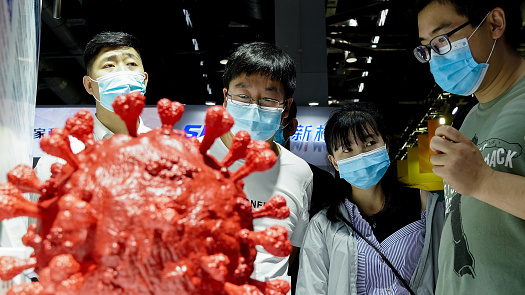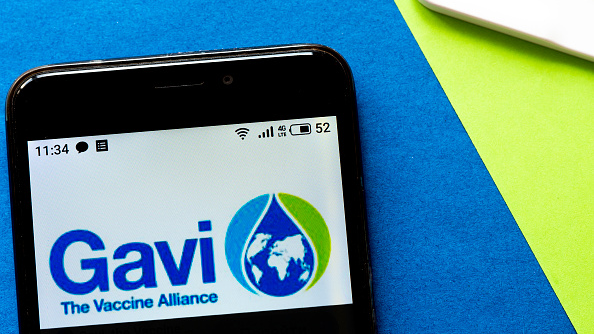
A coronavirus vaccine candidate from China National Biotec Group (CNBG), during the 2020 China International Fair for Trade in Services (CIFTIS) at Beijing Olympic Park in Beijing, China, September 5, 2020. /Getty
A coronavirus vaccine candidate from China National Biotec Group (CNBG), during the 2020 China International Fair for Trade in Services (CIFTIS) at Beijing Olympic Park in Beijing, China, September 5, 2020. /Getty
Editor's note: Stephen Ndegwa is a Nairobi-based communication expert, lecturer-scholar at the United States International University-Africa, author and international affairs columnist. The article reflects the author's opinions and not necessarily the views of CGTN.
For its partners and cooperators, China is not known for reneging on its promises or manipulating them for selfish reasons. Therefore, committing its oft-repeated pledge to make its vaccine against the coronavirus available for free to the developing world is as good as it sounds.
With this move, China became a member of COVAX (Covid-19 Vaccines Global Access), a World Health Organization (WHO) backed global COVID-19 vaccine facility aimed at ensuring universal access and affordability of the drug.
The initial aim is to have 2 billion doses available by the end of 2021, with first priority given to high risk and vulnerable demographics.
In a statement posted on Twitter on October 9, China's Foreign Ministry spokesperson Hua Chunying said that the decision was "an important step China has taken to uphold the concept of a shared community of health for all and to honor its commitment to turn COVID-19 vaccines into a global good."
Hua stressed that, "Currently, the COVID-19 pandemic still poses a severe threat to the safety and health of people in all countries. China continues to focus on ensuring that developing countries have equal access to appropriate, safe and effective vaccines."
This is one of the most reassuring and positive messages in the current situation amid the rising number of deaths and socio-economic despondency caused by the pandemic. China currently has four vaccine candidates in stage three trials, the penultimate stage which involves actual human trials.
But China's new donor agreement with Global Alliance for Vaccines and Immunization (Gavi) is not its first involvement with the Geneva-based public-private global health partnership. The story goes back to September 9, 2015, when the Chinese government signed an agreement with Gavi aimed at supporting the immunization of hundreds of millions of children in developing countries by the end of 2020. At the Gavi Berlin Pledging Conference held at the time, China made an initial contribution of $5 million for the period 2016–2020.
Years before, in 2002, Gavi had supported China by introducing the Hepatitis B vaccine into the latter's Expanded Program on Immunization (EPI). Through the resulting widespread immunization, the country's newborns immunized with the first dose at birth rose from an average of 64 percent to 90 percent. Currently, less than one percent of Chinese children under five years old are infected with Hepatitis B.

A Global Alliance for Vaccines and Immunization (Gavi) logo is displayed on a smartphone. /Getty
A Global Alliance for Vaccines and Immunization (Gavi) logo is displayed on a smartphone. /Getty
Now, this initiative by the second largest economy in the world can be quantified as donor funds. It will free up millions of dollars in foreign exchange that would have gone into purchasing the huge quantities of vaccine doses necessary to immunize millions of people.
With the move, China is also putting its money where its mouth is. As the largest developing country, it has championed the essence of South-South cooperation in various sectors. With the coronavirus vaccine donations, it will contribute immensely to the general welfare of its developing partners, thus helping to maintain the momentum of current and new collaborations.
China's gesture is in line with its stated commitment to play a significant role in fighting global poverty. Definitely, the drastic reduction in Hepatitis B in the country's children under five years old has contributed immensely over the years not only in reducing the disease burden, but also nurturing millions of healthy individuals who have been instrumental in the fight against poverty.
China's COVID-19 vaccine will also help to fully open up the global economy. The confidence from a coronavirus vaccine is bound to have a great positive effect on the world's equity markets as investors return to some modicum of normalcy. This will also help to fully restore supply chains that had been disconnected by measures against the pandemic.
Apart from nationalism, there would be no reason why countries the hardest hit by the coronavirus like the United Kingdom, Spain and Italy cannot purchase vaccines from China. Moreover, they would also be contributing to China's magnanimity to the developing world, by helping to offset some massive costs of the vaccine's production.
A Chinese vaccine should be a welcome move in the Western world, which has generally been in "competition" for who will be first to pass the post with a successful vaccine candidate. Unlike, for example, the United States where President Donald Trump has been trying to rush the process for both political and prestige reasons, the Chinese vaccine, when finally certified, would have gone through rigorous protocols.
Ultimately, a COVID-19 vaccine may not be a panacea for the total eradication of the pandemic from the face of the world. It will definitely not fix some of the damage caused by the coronavirus. However, it will give people a certain level of confidence and comfort in the new normal way of life. And that is priceless right now.
(If you want to contribute and have specific expertise, please contact us at opinions@cgtn.com.)